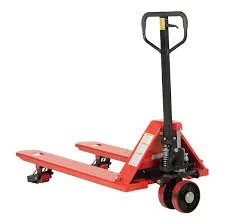


Understanding Pallet Jack Costs A Comprehensive Guide
Pallet jacks, commonly referred to as pallet trucks, are vital tools in warehouses, distribution centers, and retail environments. They are designed to lift and move pallets filled with goods quickly and efficiently, minimizing the need for manual labor. However, when considering the purchase of a pallet jack, understanding the various factors that contribute to its cost is essential.
Types of Pallet Jacks and Their Costs
The cost of a pallet jack can vary significantly depending on the type you choose. There are primarily manual and electric pallet jacks, each with its own price range.
1. Manual Pallet Jacks These are the most straightforward type, relying on human effort to lift and transport pallets. Their prices can range from approximately $200 to $1,000 depending on the quality, brand, and load capacity. Manual pallet jacks are suitable for light to moderate usage, making them an affordable option for small businesses or environments where heavy lifting is infrequent.
2. Electric Pallet Jacks These offer increased efficiency and ease of use, particularly in larger warehouses where lifting heavy pallets frequently could pose a strain on workers. Depending on the brand and specifications like battery size and power capabilities, electric pallet jacks typically range from $3,000 to $7,000. While the initial investment is higher, the increased productivity and reduced labor costs can often justify the expenditure.
Factors Affecting Pallet Jack Costs
1. Load Capacity One of the most critical factors influencing cost is the load capacity of the pallet jack. Manual models generally handle loads between 3,000 to 5,500 lbs, while electric versions can manage even heavier weights. Higher load capacities typically translate to increased prices.
2. Build Quality and Materials The construction of the pallet jack also impacts price. Heavy-duty models made from high-grade materials will generally be more expensive due to their durability and longevity in demanding environments.

3. Brand Reputation Established brands often charge more for their pallet jacks due to the reputation they have built over the years for reliability and customer support. However, investing in these brands can reduce the likelihood of malfunctions and breakdowns in the long term.
4. Additional Features Certain pallet jacks come equipped with features such as built-in scales for weighing pallets, ergonomic handles for comfort, and advanced steering capabilities. These additional features can significantly raise the cost but can also enhance operational efficiency.
5. Market Demand Just like any other industry, market trends can affect pallet jack prices. During peak seasons or times when there is a surge in demand, prices may increase.
Long-Term Cost Considerations
When assessing the cost of a pallet jack, it’s essential to look beyond the initial purchase price. Consider potential maintenance costs, battery replacements (for electric models), and overall durability. Investing in a more expensive, high-quality pallet jack may be more cost-effective over time due to reduced repair and replacement needs.
Additionally, consider the potential savings in labor costs. An electric pallet jack can significantly decrease the time it takes to move goods around a warehouse, ultimately leading to increased productivity and profitability.
Conclusion
In conclusion, the cost of a pallet jack can vary widely based on type, capacity, build quality, and additional features. Whether you are a small business looking for an economical manual option or a large warehouse needing the efficiency of an electric model, understanding these factors will help you make an informed decision. Balancing initial expenses with long-term savings and efficiency is key to getting the best value for your investment. Ultimately, choosing the right pallet jack will enhance your operations and contribute to a more productive work environment.



